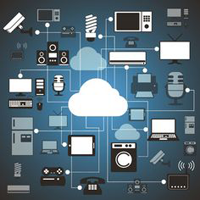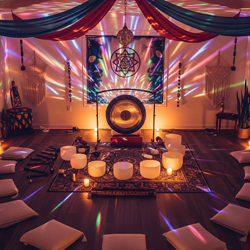The Internet of Things (IoT) is rapidly expanding, connecting billions of devices and impacting nearly every aspect of our lives. From smart homes and wearable tech to self-driving cars and medical implants, the promise of a hyper-connected world is alluring. But what is the impact of this technological hyper-connectivity on our authenticity? Does the convenience and efficiency offered by the IoT come at a cost to our spiritual wellbeing, our sense of presence, and our connection to what truly matters?
The term Internet of Things was coined in 1999 to describe the interconnection of wireless sensor-based devices across the Internet. There are now approximately 20 billion of these devices online worldwide, and they are set to become a trillion-dollar industry. They can be found within such things as home appliances, vehicles, road sensors, phones, watches, and microchip and medical implants. Networks of these devices are starting to form new “smart environments” and “smart cities”, touted as the solution for efficiency and sustainability as information is communicated from the devices to the cloud for data collection and feedback-control of the devices. For example, information from road sensors that monitor the flow of traffic can be used to divert traffic or impose speed limits through signals or, at some time in the future, through the remote control of the vehicles. Information from home appliances and smart meters can be transmitted to a city’s “smart grid” that monitors and controls energy use. Songdo (South Korea), Milton Keynes (UK), and San Jose (USA) are examples of the emerging smart cities that are being created as future models for human living. But at what cost to our humanity?
Voices critical of the Internet of Things tend to mention the challenges to privacy and security, the increased possibilities of mass surveillance, and the health risks of increased exposure to wireless radiation. In this post, I’ll address a less discussed but equally crucial issue: the threat to our authentic living posed by the Internet of Things. In doing so, I’ll tackle the root causes of inauthentic living and explore how we can maintain our authenticity as we seek a deeper connection to ourselves and the world around us.
The Challenge to Authentic Living
The Internet of Things and Its Impact on Autonomy
The Internet of Things brings information gathering and control systems ever deeper into our lives, often on a highly automated level, even reaching into our bodies as implants. This intrusion raises profound questions about personal autonomy. Surrendering our awareness and control to a centralised system represents a clear loss of personal boundaries and autonomy. As natural human senses give way more and more to electronic sensors, are we dulling our humanity and weakening our presence in the world? As Google’s ex-chairman Eric Schmidt said of his vision of the future:
“There will be … so many devices, sensors, things that you are wearing, things that you are interacting with that you won’t even sense it. It will be part of your presence all the time.”
Abdication of Responsibility: A Core Issue
Grand visions of technology assisting and automating our lives can be very enticing. And here we come to an important issue of authenticity that has dogged the human race for so long: the abdication of responsibility. When an oversized, centralised system such as a modern state society, or a global economy, manifests sustainability issues, the solution is not for us to give away more responsibility by accepting the further imposition of control systems run by the very structures that are unsustainable, but rather to address the root cause of unsustainable living, which is the loss of our authenticity through dissociation, the abdication of self-responsibility, and the support we give to oversized, centralised systems that by their very nature are unsustainable. This means taking ownership of our choices and actions, rather than passively accepting those that technocracy would impose on us.
Are Smart Cities Truly Sustainable?
Smart cities, by definition, remain unsustainable, even if they succeed in regulating energy use and transport flow to slightly more acceptable levels or feed renewable electricity into the power grid. In a smart city, the ecological problems of urbanisation and an oversized, centralised system remain. Furthermore, the proliferation of electronic sensors to be placed within almost anything requires an explosive increase in the manufacture of semiconductors, a process that relies on heavy metals, carcinogens, and other hazardous substances, as well as intensive energy use. The toxic contamination of areas surrounding semiconductor manufacturing plants and landfills is a notorious environmental problem.
Authenticity vs. Technology: Striking a Balance
Sustainable living does not require a huge, unsustainable technological infrastructure of monitoring and control. It requires the practice of mindfulness by each person to understand the effects of their actions, their interconnectivity with all things, and their capacity for compassionate, ecological living as they embrace their true self. This capacity requires that we own our responsibility, not abdicate it to technology.
The Role of Communities in Cultivating Authentic Living
Communities and ecosystems thrive when individuals practice mindful and ecological living. This is much more possible when human behaviour is not regulated by large centralised control systems, and when personal autonomy is not devalued and diminished. When people are treated as if they have to be regulated, because of the inauthentic nature of the society in which they live, and the encouragement of dissociation and abdication of responsibility, they are more likely to behave as if they have to be regulated. What we most need for authentic living is a shift of values towards the spirit of things.
Dissociation and Its Role in Inauthentic Living
Dissociation is at the heart of inauthentic living. It causes us to be less present in our true self, the place where we feel most connected, compassionate, and ecological. The Internet of Things promotes dissociation by requiring our awareness and will to be displaced by an outsourced means of sensing and regulating our lives. Natural human senses give way to electronic sensors, and the decision-making of the mind gives way to computer programs or centralised powers. The idea of remotely controlling a thermostat through the cloud to turn on our heating may seem to give us more control over our lives, but this belies the slippery slope towards ever-greater, external regulation of our behaviour. Are we becoming slaves to convenience, sacrificing our presence and awareness in the process?
Technology and Mindfulness: A Question of Conscious Choice
In my post, Self Empowerment, I discuss the importance of self-empowerment for living authentically, finding self-realisation, and fulfilling our life purpose. Our society is caught in a debilitating trance that I call the Spectacle of Materialism. We can break out of this trance by using mindfulness and choosing authenticity over the conformity to inauthentic patterns of living. Technology has a valuable place in our world, but it’s how we use it that counts. Do we use it mindfully to further authentic living, or do we use it to take us further into inauthenticity? The choice is ours.
How to Overcome Inauthenticity
If you find yourself in a state of numbness or apathy, passively accepting the drift toward greater inauthenticity, you can change things. Begin by practising mindfulness (see my posts How Mindfulness Gives You Freedom and Overcoming Apathy and Action-Paralysis). Utilise the three processes of self-awareness, self-liberation, and self-actualisation (see my post Self-Empowerment). Rather than supporting oversized, centralised systems because you think there’s no alternative, co-create an alternative with others in your local area: build local authentic communities with local economies (see my posts How You Can Start an Authentic Community, 8 Good Reasons to Use a Local Complementary Currency, and Spiritual Community). The world, and your authentic self, is in your hands.
Spread the Word
Like this article? Share it with others and make a stand for authentic living.
Related Posts:
Self-Empowerment
How Mindfulness Gives You Freedom
Overcoming Apathy and Action-Paralysis
How You Can Start an Authentic Community
8 Good Reasons to Use a Local Complementary Currency
Spiritual Community


